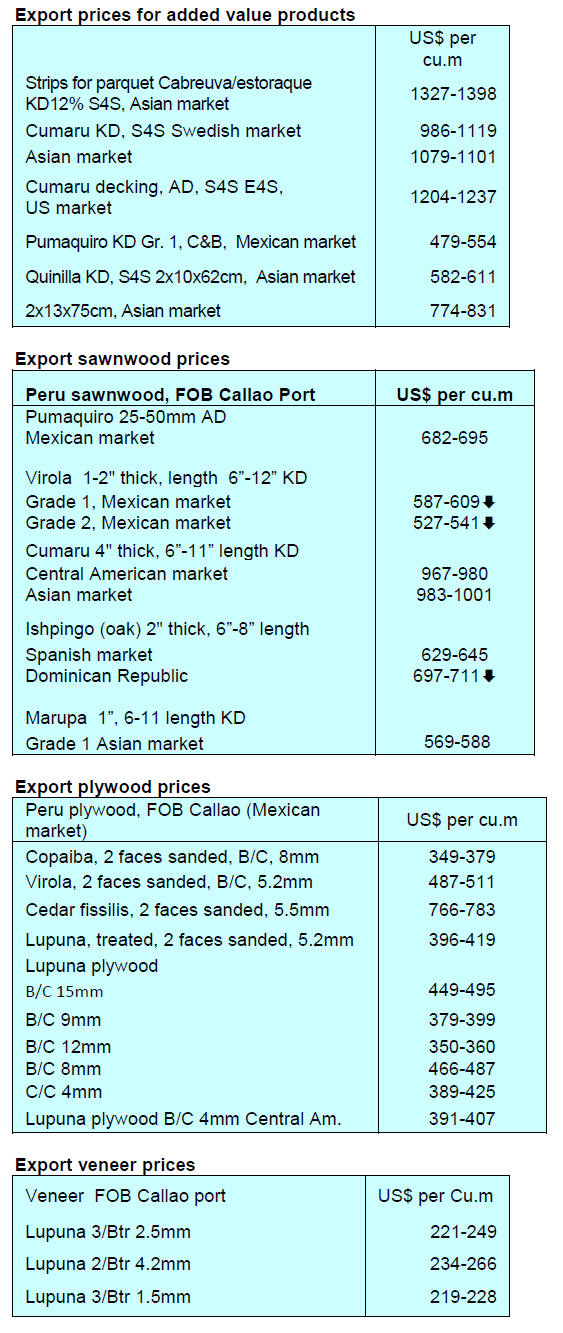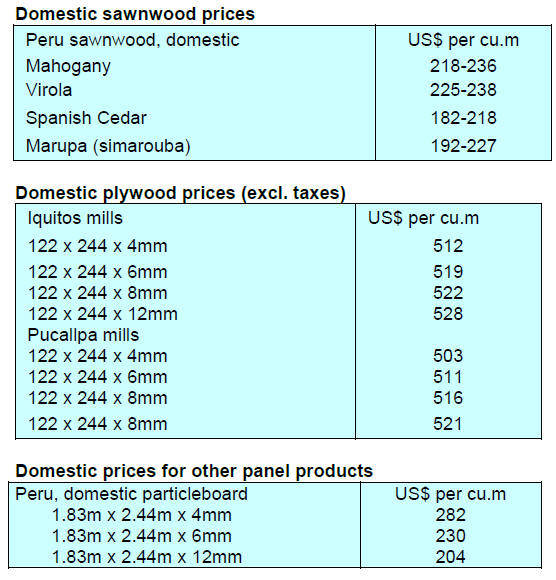4.
INDONESIA
EU and domestic regulations could
weaken furniture exports
The combined impact of the EUDR and the Indonesian government's
legality verification system (SVLK) could potentially hurt the domestic
furniture industry and erode Indonesia's furniture export competitiveness
according to Abdul Sobur, chairman of the Indonesian Furniture and
Handicraft Industry Association (Himki).
When the EUDR is implemented this will add to production and delivery costs
and if prices do not rise then eventually the regulations will weaken
Indonesia's competitiveness, Abdul said. He added, unnecessary costs must be
eliminated as restrictive regulations could hamper the target to achieve
US$5 billion in furniture exports.
See:
https://jakartaglobe.id/business/overlapping-deforestation-laws-in-eu-indonesia-hurt-furniture-exports
and
https://investor.id/business/331929/tumpang-tindih-regulasi-tekan-ekspor-furnitur-nasional
In related news, the Director General of Agro-Industry at the Ministry of
Industry (Kemenperin), Putu Juli Ardika, denied that the EUDR will
negatively impact exports of products from Indonesia as, according to him,
“the majority of exporters already have certificates meeting EU standards
ensuring the manufacturing process for exported products does not damage the
forest.
See:
https://www.msn.com/id-id/ekonomi/bisnis/uu-anti-deforestasi-disebut-hambat-ekspor-%20%20komoditas-indonesia-kemenperin-dampaknya-tidak-signifikan/ar-AA1chUTK
Coordinating Minister of Economic Affairs, Airlangga Hartarto, has said that
Indonesia has 18 months remaining to act before the implementation of the
EUDR, adding that the regulation would label products as originating from
high-risk, standard or low-risk countries.
He said Indonesian commodities potentially impacted by the EUDR include palm
oil and derivatives, coffee, soya, cocoa, beef and wood products.
Deforestation rate in 2022, a steady decline
The Minister of Environment and Forestry, Siti Nurbaya, reported
Indonesia's deforestation rate in recent years to the House of
Representatives. According to the Minister, Indonesia's deforestation rate
continues to decline year by year. She revealed that in 2015 Indonesia's
deforestation rate was recorded at 1.09 million hectares but it had fallen
to 460,000 hectares in 2019.
The rate of deforestation fell again in 2021 to
110,000 hectares. The Minister revealed that in 2022 deforestation extended
over 107,000 hectares. She explained that, to monitor deforestation, the
Directorate General of Forestry Planning and Environmental Management has
developed a National Forestry Monitoring System (Simontana) that records the
condition of Indonesia's forests.
See:
https://forestinsights.id/laju-deforestasi-indonesia-tahun-2022-menteri-lhk-angkanya-terus-menurun/
Social forestry creating economic growth in villages
The Minister of Environment and Forestry has said that the concept
of social forestry, which gives communities the right to manage forests in a
sustainable manner, can create economic growth in villages. Communities can
secure social forestry management rights through five schemes: village
forest management schemes, community forestry, community plantation
forestry, customary forest and partnership schemes.
The Minister said that social forestry has also expanded to the downstream
sector so that communities can now develop into productive communities.
See:
https://en.antaranews.com/news/285111/social-forestry-creating-new-economic-growth-in-villages-minister
Seek export opportunities from US-China trade dispute
Indonesia must optimise opportunities arising from the ongoing
trade dispute between the United States and China according to the
Coordinating Minister for Economic Affairs, Airlangga Hartarto. He said that
Indonesia has become a member of the first regional cooperation group to
focus on supply chain issues namely the Indo-Pacific Economic Framework
(IPEF).
The other IPEF members include Brunei, Fiji, Singapore, Thailand, Malaysia,
Vietnam, Australia, India, Japan, New Zealand, South Korea, the Philippines
and the United States.
IPEF member countries have committed to realising economic cooperation
involving the private sector as well as implementing technical assistance
and capacity-building programmes.
See:
https://en.antaranews.com/news/285141/indonesia-must-take-advantage-of-us-china-trade-war-minister
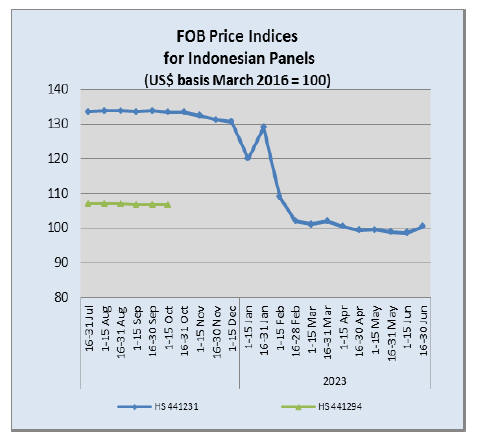
5.
MYANMAR
State-owned banks sanctioned further
The Office of Foreign Assets Control (OFAC) in the United States
has imposed fresh sanctions on Myanmar’s defense ministry and two
state-owned banks saying that they facilitated transactions between the
military-controlled government and overseas markets, including for weapons
and military equipment.
In response to US action a government spokesman said the US was pushing
Myanmar toward an economic and political crisis and that the new sanctions
won’t hurt the economy because international banking services are also
provided by local private banks and branches of foreign banks.
See:
https://home.treasury.gov/news/press-releases/jy1555
and
https://www.thestar.com.my/aseanplus/aseanplus-news/2023/06/24/us-sanctions-myanmar-defence-ministry-two-state-owned-banks-also-get-same-treatment
According to timber exporters the new OFAC sanctions came as no surprise.
The Myanma Timber Enterprise (MTE), the sole and official suppliers of
timber raw material, is already facing sanctions. The new OFAC measures
could be a serious blow to the MTE since the US dollar is the currency for
tenders.
During the first two months of the 2023-24 fiscal year the value of timber
exported was around US$13 million according to the Myanmar Trade Department
website. The timber sector is no longer a top foreign currency earner.
Currently, the agricultural sector is top earning followed by marine
products and minerals.
Slim hope for quick recovery
In its latest Economic Monitor report the World ban says “economic
conditions in Myanmar have stabilised in the first half of 2023. Exchange
rates have remained steady, while inflation in food and fuel prices has
eased. Most indicators suggest economic activity is slowly increasing,
albeit from a very low base.
Manufacturing output and new orders have risen
quickly, sales of domestic products have picked up, while passenger and
freight transport volumes are rising. Although agricultural production seems
to have weakened, profitability is improving as farmgate prices rise and
input costs ease and this is likely to prompt higher production in coming
seasons.
Firms across all sectors report operating at higher capacity in the last
quarter, with companies in non-retail services performing best. Retail
sector performance has also improved, with sales picking up and firms
sourcing more goods locally.
However, several factors are constraining the pace of this recovery.
Household incomes remain weak, limiting the ability of domestic demand to
drive growth. High prices and shortages resulting from import restrictions
make it difficult for many businesses to source essential inputs, while
power outages have become prominent. Investment remains weak, with new
business registrations at a low level. Other than in the agriculture sector,
reported profits continue to decline as the conflict raises costs and limits
activity in some areas.
Overall, the economy is still operating well below pre-pandemic levels, in
sharp contrast to the rest of the region. Policy changes continue to create
uncertainty and obstacles for doing business, with further regulations and
restrictions introduced on international trade and financial transfers”.
See:
https://www.worldbank.org/en/country/myanmar/publication/myanmar-economic-monitor-june-2023-a-fragile-recovery-key-findings
6.
INDIA
Inflation trends down
The annual rate of inflation based on the India Wholesale Price
Index (WPI) in May was minus 3.5% compared to minus 0.9% recorded in April
2023.
The decline in the rate of inflation in May was primarily due to a fall in
prices of mineral oils, basic metals, food products, textiles, non-food
articles, crude petroleum and natural gas and chemical products. Out of the
22 NIC two-digit groups for manufactured products, 7 groups saw an increase
in prices whereas 11 groups saw a decline.
The groups that have recorded major increase in prices were electrical
equipment; pharmaceuticals, medicinal, chemical and botanical products;
tobacco products; wood and products of wood and cork (except sawnwood);
leather and related products and beverages. Some of the groups that say a
decrease in prices were basic metals, food products and textiles.
See:
https://eaindustry.nic.in/pdf_files/cmonthly.pdf
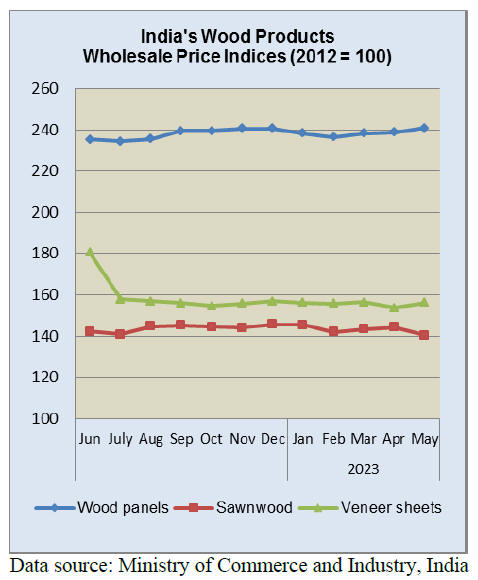
State Forest Departments to report
statistics directly to national database
The Ministry of Environment, Forest and Climate Change has released
the “National Working Plan Code-2023 for forest management and this includes
a new approach to data reporting. The new Code-2023 requires state forest
departments to report data to a national centralised database. This could
result in forest data become available much faster than at present.
Code-2023 was announced by Shri. Chandra Prakash Goyal, Director General of
Forests and Special Secretary, Ministry of Environment, Forest and Climate
Change. The Code-2023 guides State Forest Departments in the preparation of
working plan for forest across the country.
See:
https://observervoice.com/national-working-plan-code-2023-released-for-scientific-management-of-forests-and-evolving-new-approaches-26261/
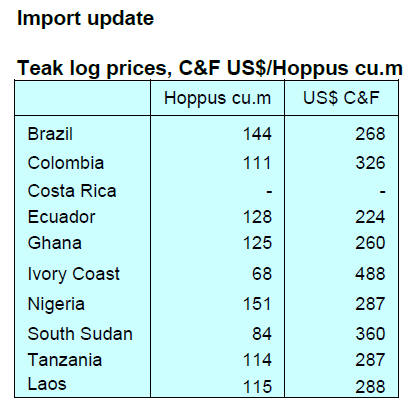

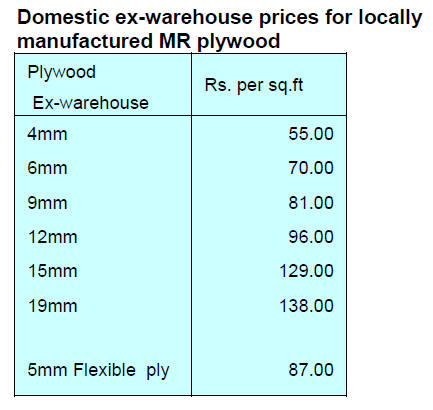
7.
VIETNAM
Wood and wood product (W&WP) trade
highligts
April
Imports of logs and sawnwood from the US in April 2023 stood at
42,760 cu.m worth US$19.46 million, down 12% in volume and 10% in value
compared to March 2023 but up 1.6% in volume and down 8% in value compared
to April 2022. In the first 4 months of 2023 imports of raw wood from the US
amounted to 147,260 cu.m worth US$65.05 million, down 5% in volume and 12%
in value over the same period in 2022.
Imports of logs and sawnwood in April 2023 were the lowest level in many
years, amounting to 41,330 cu.m at a value of US$15.85 million, down 37% in
volume and down 36% in value compared to March 2023 and down 49% in volume
and down 48% in value compared to April 2022.
May
Vietnam’s W&WP exports to the UK in May 2023 reached US$21 million, up 14%
compared to May 2022. In the first 5 months of 2023, exports of wood and
wood products to the UK have been estimated at US$81.3 million, down 32%
over the same period in 2022.
Vietnam’s office furniture exports in May 2023 were valued at US$23
million, down 25% compared to May 2022. In the first 5 months of 2023 office
furniture exports earned US$107.3 million, down 32% over the same period in
2022.
Vietnam's wood imports in May 2023 were at 6,700 cu.m, worth US$3.0
million, up 16% in volume and 15% in value compared to April 2023. However,
compared to May 2022 imports decreased by 79% in volume and 76% in value. In
the first 5 months of 2023 wood imports stood at 58,300 cu.m worth US$25.9
million, down 51% in volume and 44% in value over the same period in 2022.
In May 2023, exports of wood and wood products earned US$1.05 billion,
down 3.4% compared to April 2023 and down 25% compared to May 2022. In
particular, WP exports accounted for US$760.5 million, down 2% compared to
April 2023 and down 20% compared to May 2022.
In the first 5 months of 2023 W&WP exports were valued at US$4.96 billion,
down 29% over the same period in 2022. Of this WP exports contributed
US$3.37 billion, down 35% over the same period in 2022.
Vietnam’s W&WP exports to the German market in May 2023 reached US$3.7
million, down 62% compared to May 2022. In the first 5 months of 2023 W&WP
exports to Germany earned about US$27.5 million, down 57% over the same
period in 2022.
According to preliminary statistics exports of living-room and dining-room
furniture in May 2023 generated US$191 million, down 28% compared to May
2022. In the first 5 months of 2023 exports of living-room and dining-room
furniture accumulated US$836 million, down 40% over the same period in 2022.
In May 2023 W&WP imports into Vietnam were valued at US$216.7 million, up
28% compared to April 2023 but down 33% compared to May 2022. In the first 5
months of 2023 W&WP imports totalled at US$850.1 million, down 33% over the
same period in 2022.
Vietnam's imports of poplar wood in May 2023 were 38,700 cu.m, worth
US$16.3 million, up 29% in volume and 28% in value compared to April 2023.
Compared to May 2022 imprts increased by 14% in volume but decreased by 7%
in value. In the first 5 months of 2023 poplar imports reached 119,200 cu.m,
worth US$49.7 million, down 8% in volume and 22% in value over the same
period in 2022.
Declining log and sawnwood imports from Africa
Vietnam’s imports of logs and sawnwood from Africa in April 2023
declined to the lowest level in many years with a volume of 41,330 cu.m
equivalent to US$15.85 million, down 37% in volume and 36% in value compared
to March 2023 and year-on-year down 49% in volume and 48% in value.
Over the first 4 months of 2023, imports from Africa were recorded at
285,510 cu.m, with a value of US$113.25 million, down 18% in volume and 11%
in value year-on-year.
CITES has listed the entire African population of species under three genera
including Pterocarpus spp. (padouk), Afzelia spp. (mahogany/pachy/doussie)
and Khaya spp. (Acajen) in Appendix 2.
With this CITES decision trade in the newly added species from African
countries require licenses issued by the CITES management authority of the
supply country in accordance with CITES regulations.
As Africa is the top supplier of tropical hardwood to Vietnam and padouk is
the major imported timber from Africa the CITES decision has had a
significant impact on the import and use of African wood in Vietnam. Many
wood-industry villages which specialise in traditional furniture for the
domestic market are suffering a scarcity of wood raw material. Continued
imports of species listed in CITES is forecast to decrease in 2023 and
thereafter.
African hardwood suppliers
In the first 4 months of 2023 wood imports from Cameroon, the
Democratic Republic of the Congo, South Africa, Nigeria, Gabon, the Republic
of Congo declined, while imports from Angola increased.
Cameroon remains as the top supplier delivering 24,680 cu.m (equivalent to
US$10.54 million) in April 2023, down 37% in volume and 34% in value
compared to March 2023 and down 39% in volume and 40% in value compared to
April 2022.
Over the first 4 months of 2023 imports of raw wood from Cameroon reached
169,310 cu.m, with a value of US$73.16 million, down 4% in volume and 2% in
value over the same period in 2022.
Imports from Cameroon in April fell sharply compared to March 2023 and
showed a remarkable year-on-year decline. Over the first 4 months of 2023
log imports from Cameroon decreased by 3% in volume but increased by 1.3% in
value compared to the same period in 2022. Sawnwood imports fell by 5% in
volume and 6% in value.
Angola exported to Vietnam 1,240 cu.m (US$393,000) in April, down 79% in
volume and 34% in value compared to March 2023 and down 39% in volume and
40% in value compared to April 2022.
In the first 4 months of 2023 imports of raw wood from Angola totalled at
20,010 cu.m with a value of US$5.47 million, up 10% in volume and 16% in
value over the same period in 2022. Angola is currently the second largest
supplier of African hardwood to Vietnam.
The volume of sawnwood shipped from Angola to Vietnam over the first 4
months of 2023 amounted to 16,650 cu.m, with a value of US$4.77 million, up
45% in volume and 74% in value over the same period in 2022; In contrast,
imports of logs from this market decreased by 50% in volume and 65% in
value.
South Africa sold 4,670 cu.m to Vietnam worth US$1.23 million in April 2023,
down 24% in volume and 24% in value compared to March 2023 but up 2% in
volume and 14% in value compared to April 2022.
Over the first 4 months of 2023 imports of raw wood from South Africa
reached 16,240 cu.m, with a value of US$4,345 million, down 39% in volume
and 35% in value over the same period in 2022.
Nigeria’s supply dropped in the first 4 months of 2023. Sawn wood imports
from Nigeria to Vietnam were 12,840 cu.m, with a value of US$3.65 million,
down 28% in volume and 26% in value.
African log and sawnwood prices
The average price of logs imported from Africa into Vietnam in
April 2023 was US$372/cu.m, down 3.5% compared to March 2023 but up 3.3%
compared to April 2022. In the first four months of 2023 the average price
of imported logs was US$404/cu.m, up 13% over the same period in 2022.
The average price of imported sawnwood in April 2023 was US$391/cu.m, up 4%
compared to March 2023, down 3% compared to April 2022. Overall, in the
first 4 months of 2023 the price of sawnwood from Africa averaged US$387/cu.m,
up 2.4% over the same period in 2022.
Serious decline in exports of wood and wood products
At a press conference during the Vietnam ASEAN International
Furniture and Home Accessories Fair 2023 (VIFA ASEAN 2023) Tran Ngoc Liem,
Director of the Vietnam Chamber of Commerce and Industry, Ho Chi Minh City
said that because of the difficult situation in the global economy each
month there are hundreds of businesses withdrawing from exporting.
The sharp decline in exports of wood and wood products is due to rising
production costs, especially power and fuel. The slow recovery of the world
economy and the collapse of some banks in the world has also affected the
buying trend of consumers said Tran Ngoc Liem. Consumers have tight budgets
for non-essential products such as wood and wood products in some markets
such as the USA and EU and this has caused a sharp drop in demand.
Another problem is that wood industry enterprises still have difficulty in
accessing capital and bank interest rates are high. Many businesses are
short of orders but finding a solution is a challenge but essential if
companies want to maintain production and retain workers.
At the current growth rate it is forecast that exports of wood and wood
products in the first half of 2023 will have dropped by around 30% compared
to the same period in 2022.
According to Mr. Cao Ba Dang Khoa, Acting General Secretary of the Vietnam
Coconut Association in the face of the current difficult situation,
organising a furniture fair would help Ho Chi Minh City gain an opportunity
to become a regional and international furniture centre.
As one of the businesses having great success in finding orders at fairs,
Mr. Cao Van Dong, General Director of Kettle Interiors Asia Co., Ltd. said
that in March 2023 his business participated in VIFA EXPO 2023 in Ho Chi
Minh City and obtained positive results.
Mr. Dang Quoc Hung, Chairman of the Board of Directors of Alliance
Handicraft Wooden Fine Art Corporation said that the Vietnam ASEAN
International Furniture and Home Accessories Fair 2023 with the theme "
Discover the fascination of Vietnamese furniture and handicrafts”, is
expected to attract 350 domestic and international furniture and handicraft
manufacturers.
According to Mr. Hung the fair promises to become an important trade
promotion venue of ASEAN's regional stature. The diversity and abundance of
product lines displayed by enterprises from participating countries will
meet all the demands of the multi-segment interior and exterior of the world
market.
The Vietnam ASEAN International Furniture and Home Accessories Fair 2023
(VIFA ASEAN 2023) is hosted by the Alliance Handicraft Wooden Fine Art
Corporation in collaboration with Vietnam Chamber of Commerce and Industry -
Ho Chi Minh City Branch (VCCI - HCM). The event will take place from 29
August to 1 Septembe at the Saigon Exhibition and Convention Center.
See:
https://vietnamagriculture.nongnghiep.vn/wood-exports-fell-sharply-businesses-found-orders-through-fairs-d351975.html
8. BRAZIL
Pau-Brazil bows seized
Brazil imposes restrictions on the harvesting of brazilwood or
pau-brasil (also known as pau-de-pernambuco) (Paubrasilia echinata) and
sales of artifacts made of brazilwood are strictly regulated.
However, an illegal trade in brazilwood has been a major challenge for
authorities for years. The states of Espírito Santo and Bahia are the two
major states with remaining natural forest where brazilwood can be found and
it is here that there are cases of illegal logging.
At the Guarulhos International Airport the Brazilian Institute of
Environment and Renewable Natural Resources (IBAMA) inspectors have since
2016 seized more than 1,500 finished brazilwood bows and also pieces of
brazilwood. IBAMA says that, currently, no Brazilian company that is in the
bow manufacturing sector has stocks of brazilwood and that exports of
brazilwood bows and brazilwood items haveceased.
See:
https://valor.globo.com/agronegocios/noticia/2023/06/12/no-aeroporto-de-cumbica-ibama-ja-apreendeu-1-650-arcos.ghtml
In Brazil, production of bows is done by few
companies. Most of which are located in Espírito Santo state. Many foreign
bow manufacturers hold sizeable stocks of sawn brazilwood so they can
maintain production for some years.
Development of the forestry sector
About 58% of Brazil is covered by forests and yet the forest
economy contributes only a small share of GDP. Brazil accounts for less than
10% of the world production of tropical timber according to the
International Tropical Timber Organization.
According to a study by the 2030 Amazon Project the global trade in
non-timber forest products is worth more than US$150 billion but Amazonian
companies had less than a 2% share of this total so the potential for growth
is enormous.
The 2030 Amazon Project suggests SFM techniques are already applied by many
timber companies in the Amazon and if just 5% of the area of the Legal
Amazon were under SFM it would be possible to supply 10 million cubic metres
of wood per year without deforestation.
See:
https://globorural.globo.com/opiniao/vozes-do-agro/noticia/2023/06/o-brasil-e-agro-e-florestal.ghtml
and
https://amazonia2030.org.br/project/
Export update
In May 2023 Brazilian exports of wood-based products (except pulp
and paper) decreased 35% in value compared to May 2022, from US$503.3
million to US$329.2 million.
Pine sawnwood exports declined 12% in value between May 2022 (US$84.6
million) and May 2023 (US$74.5 million). In volume, exports increased 4%
over the same period from 295,200 cu.m to 306,300 cu.m.
Tropical sawnwood exports dropped 34% in volume, from 43,900 cu.m in May
2022 to 29,000 cu.m in May 2023. In value exports fell 21% from US$18.8
million to US$14.9 million over the same period.
Pine plywood exports faced a 37% decline in value in May 2023 compared to
May 2022, from US$101.9 million to US$63.8 million. In volume exports fell
18% over the same period, from 239,200 cu.m to 195,900 cu.m.
As for tropical plywood, exports also declined in volume by 46% and in value
by 44%, from 5,900 cu.m and US$3.4 million in May 2022 to 3,200 cu.m and
US$1.9 million in May 2023.
As for wooden furniture the exported value decreased from US$58.8 million in
May 2022 to US$52.1 million in May 2023, an 11% fall.
Indicators of Brazilian furniture exports
The report "Monitoring of Furniture Exports" is developed for
companies associated with the Brazilian Furniture Sector Project, an
initiative organised by ABIMÓVEL (Brazilian Association of Furniture
Industries / Associação Brasileira das Indústrias do Mobiliário) and
ApexBrasil (Brazilian Trade and Investment Promotion Agency).
According to a report published in April 2023, Brazil exported about US$57
million (FOB) in furniture. This result represented a 10% decrease compared
to April 2022. Furniture exports to Germany increased 42% in the 12 months
to April this year and grew 21% year on year. However exports to Saudi
Arabia dropped 60% over the past last twelve months.
Exports to Chile fell 22% in the last twelve months. In contrast exports to
Colombia dropped 23% in the past twelve months and exports to the United
Arab Emirates fell over 14% in the last twelve months.
See:
http://abimovel.com/brazilian-furniture-monitoramento-das-exportacoes-traz-indicadores-das-exportacoes-de-moveis-e-colchoes-em-abril/
New import controls in Argentina impact exports
Recent import regulations adopted in Argentina are having a big
impact on Brazilian export sales. In order to secure greater control of
supply chains and monitor of foreign trade operations the Argentine
government introduced the “Import System of the Republic of Argentina”
(SIRA) which came into force in October 2022.
The new system restricts the granting of non-automatic licenses (licenças
não automáticas - LNAs). A non-automatic license is an instrument used by
countries to control the entry of products into their countries. Brazilian
exporters can only ship products when a permit is obtained directly from the
Argentine government.
According to a survey conducted by the National Confederation of Industry
(CNI) with 252 Brazilian exporters 77% of the companies indicated that there
was a negative impact on export operations after the creation of SIRA. Out
of these, 84% said there was a reduction in the value exported to Argentina.
Among the exporters that reported a decrease in the value exported after the
implementation of the new system, 49% said that the reduction in sales to
Argentina in the period was around 40%.
With the implementation of the new system the list of goods subject to
non-automatic licenses jumped from 1,474 at the beginning of 2020 to 4,193
by the end of 2022 and 99% of the products are from the manufacturing
industry. Considering 2022 trade data, 59% of Brazilian exports to Argentina
are subject to this measure.
The three main problems pointed out by exporters are the very long payment
terms (79%), the bureaucracy for the release of foreign exchange even after
compliance with the established deadline (55%) and the change and extension
of deadlines after approval of the SIRA (42%).
See:
https://forestnews.com.br/exportadores-impactos-sistema-argentino-importacao/
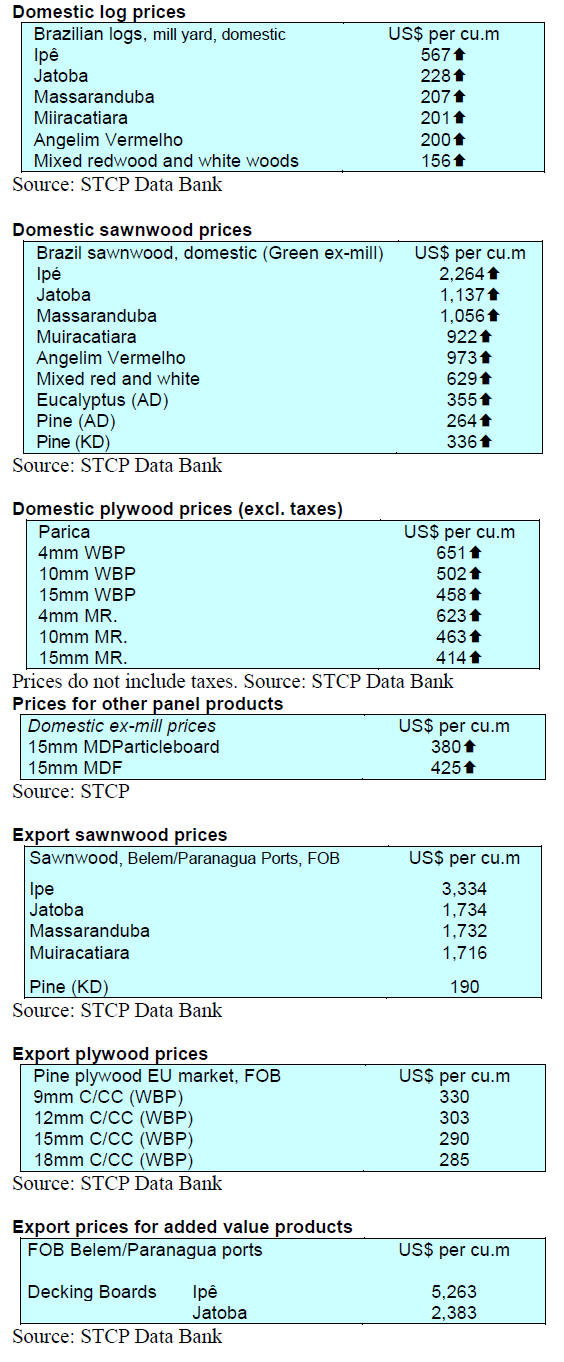
Through the eyes of industry
The latest GTI report lists the challenges identified by the private sector
in Brazil.
See:
https://www.itto-ggsc.org/static/upload/file/20230615/1686792092163403.pdf
9. PERU
Furniture imports fall in first four
months of 2023
In the first four months of 2023 the value of Peruvian imports of
wooden furniture was US$14.1 million which represented a significant
decrease of 40% compared to the same period in 2022 (US$23.6 million).
Brazil, as usual, was the main supplier at US$9.4 million representing 64%
of the total imported despite having fallen 40% compared to the same time
during 2022. China was the second largest supplier at US$1.9 million.
Shipments of semi-manufactured wood products fall
According to the Services and Extractive Industries Management of
the Association of Exporters (ADEX) export shipments of semi-manufactured
wood products in the first 4 months of the year contracted 41%, earning just
US$16.7 million compared to US$28.5 million in the same period of 2022.
The drop can be explained by lower demand from the main buyers, France down
6% (US$8.2 million), Belgium, down 39% (US$2.2 million) and China down 79%
(US$2.1 million).Among the top ten markets were Mexico (US$1.1 million),
Denmark (US$1.0 million), USA (US$0.6 million), New Zealand (US$0.4
million), Germany (US$0.2 million), Mauritius (US$0.19 million) and
Australia (US$0.14 million).
Over the past 10 years (January-April period) shipments of semi-manufactured
goods remained relatively stable. In 2014 the amount was almost US$22.2
million, in 2015 US$22.14 million, in 2016 about US$22.3 million, in 2017
US$23.4 million and in 2018 US$22.9 million.
In 2019 the amount went to US$28.4 million, to drop to US$15.6 million in
2020. In 2021 it recovered and reached US$23.9 million and in 2022 it closed
at US$28.5 million.
According to figures from the ADEX Data Trade Intelligence System between
January and April 2023 the most important item was profiled wood (except ipé)
totalling US$6.8 million.
Other shipments include moulded tropical wood (US$3.9 million) other
longitudinally profiled wood (US$2.15 million), slats and friezes for
parquet (US$1.4 million) other wood profiled on one or more faces (US $1.2
million) among others.
Lima was the region from which most semi-manufactured wood products were
exported followed by Ucayali (US$5.5 million) and Madre de Dios (US$1.2
million).
Semi-manufactured products ranked first among the
shipments of this sector surpassing sawn wood (US$14.5 million),
construction products (US$1.6 million), firewood and charcoal (US$1.4
million) and furniture and its parts (US$1.1 million).
ADEX to boost shipments from the Amazon
Over the past five years exports from the Amazon Region represented
just 0.8% of total national shipments and were from two sectors,
hydrocarbons and agro-industry. This was reported by the Association of
Exporters (ADEX) who said that last year shipments from that part of the
country totaled US$809 mil. registering an increase of 65% compared to 2021.
Traditional product shipments amounted to US$473 mil. and non-traditional at
productsthe balance.
In the first quarter of this year shipments from the Amazon amounted to
US$235.1 million, showing a growth of 6% compared to the same period in 2022
(US$220.9 million). Primary goods shipments (US$143.9 million) registered an
increase of 22% but value-added shipments (US$91.1 million) contracted 12%.
Loreto was the leading exporting region with US$89 million and the main item
was crude oil, (95%), as well as ornamental fish, multicellular centrifugal
pumps and sawn wood. San Martín, with US$4 million and an increase of 14%
exported cocoa beans, palm oil, lead and its concentrates, and coffee.
Madre de Dios with US$48 million shipped to the United Arab Emirates, India,
Belgium, China and South Korea out of a total of 24 destinations products
such as gold, Brazil nuts, sawnwood, profiled wood and others.
For its part, the Ucayali region, with US$40 million, exported crude palm
oil, tropical wood, cocoa beans, and mouldings to 23 countries including
Mexico, Colombia, France, China, Dominican Republic and Malaysia.
OSINFOR 15 anniversary
On the occasion of its fifteenth the Forest and Wildlife Resources
Supervision Agency (OSINFOR) held an event where they presented the main
achievements made in collaboration with important stakeholders in the sector
with the aim of contributing to the management, competitiveness and
sustainable use of forest resources.
The event programme included three presentations on issues of public
interest:
The contribution of inspection to forest governance for the benefit of
forest users and sustainability in the use of resources
How, through governance and within the framework of Digital
Transformation, it is possible to optimise forest supervision to achieve
improvements in its results through the efficient use of resources and
incorporation of digital technologies.
Strategic indicators to strengthen the use and trade of legal timber
contributing to improving decision-making and the implementation of public
policies.
